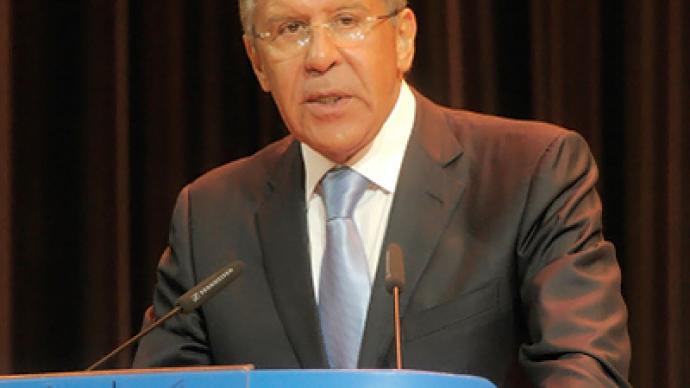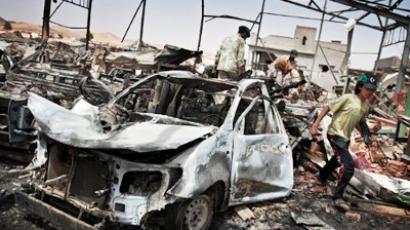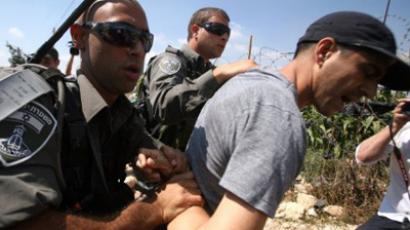Foreign Minister Sergey Lavrov releases book on Russian diplomacy

Lavrov’s book on Russian diplomacy, entitled "Between the Past and Future: Russian Diplomacy in a Changing World," is a collection of the foreign minister’s articles and speeches accumulated over the span of a lengthy career.
The 895-page book, which hit book stores this week, takes the reader on a journey through one of the most tumultuous periods of Russia’s history, when the young nation was making the painful transition from communism to capitalism. Academician Anatoly Torkunov wrote in the preface to the book that Lavrov traces “a significant stage in the formation of foreign policy pursued by new Russia and the establishment of its foreign policy philosophy on the basis on modern realities and centuries-old traditions of Russian diplomacy."This lengthy process, which saw the rise of Russia’s first democratically elected president, Boris Yeltsin, went on to give Russia what has come to be known as “sovereign democracy,” as well as a revamped foreign policy vector to address a radically changing world.Torkunov credits the country’s leaders with successfully steering that process in a fundamentally new geopolitical arena."Russian (leaders) supervised and guided that process,” the academician said, as reported by Itar-Tass. “That meant not only giving up the ideological prejudices of the past but also putting an end to illusions and uncertainty related to Russia's place and role in a qualitatively new geopolitical situation and in a new system of international relations."The first part of Lavrov’s work provides the reader with a selection of compelling articles about Russian history of the 20th and early 21st centuries. The narration includes a nice mix of quotations and comments by prominent poets, writers and philosophers, including Anna Akhmatova, Fyodor Dostoyevskiy, Walter Scott, Sergei Solovyov, and many others. Lavrov repeats, although through his own particular time and experience, the simple truth that the lessons of history should never be forgotten. The book contains golden nuggets of wisdom from a man who has spent 35 years working with the foreign ministry.The Foreign Minister devotes an entire chapter to the lessons that Russia took away from World War II (known in Russia as the Great Patriotic War). In an article entitled "One for All," Lavrov stresses that both Russians and foreigners should remember the truth about the Second World War.Russia lost an estimated 20 million soldiers and civilians in World War II.Lavrov devotes many pages to showing how Russia has adjusted to the new international situation since the end of the "cold war,” which is largely based on a policy of pragmatism and nurturing healthy bilateral relations."At the present stage, the underlying principles of Russian policy remain unchanged,” he writes. “It is pragmatism, renunciation of confrontation but protection of national interests, construction of equal and mutually beneficial relations with all partners.”The Russian foreign minister places much hope in democracy, as well as efforts to rebuild the “Euro-Atlantic agenda.”"Today, we have a unique opportunity to rebuild the Euro-Atlantic agenda on a collective and democratic basis,” he says. “The present day is time between the past and the future.”The lengthy book contains many photos, including photos featuring the heads of various states, governments and ministries: Dmitry Medvedev, Vladimir Putin, Barack Obama, George Bush and others. There's also a photo from the Munich ceremony where the Russian and American sides exchanged instruments of ratification of the new Russia-US START treaty. Sergey Lavrov was born in Moscow on March 21, 1950. In 1972, he graduated from the Moscow State Institute of International Relations (MGIMO). Following graduation, Lavrov worked at the Soviet Embassy in Sri Lanka. He began work at the Ministry of Foreign Affairs in 1976. Since 1992 until 2004 Lavrov was deputy foreign minister and director of the department of international organizations and global problems of the Russian Foreign Ministry. In 2004, Lavrov was appointed Russian Foreign Minister.Lavrov is also a permanent member of the Russian Security Council, where he is Ambassador Extraordinary and Plenipotentiary.Robert Bridge, RT














